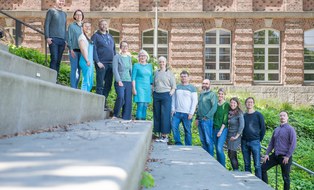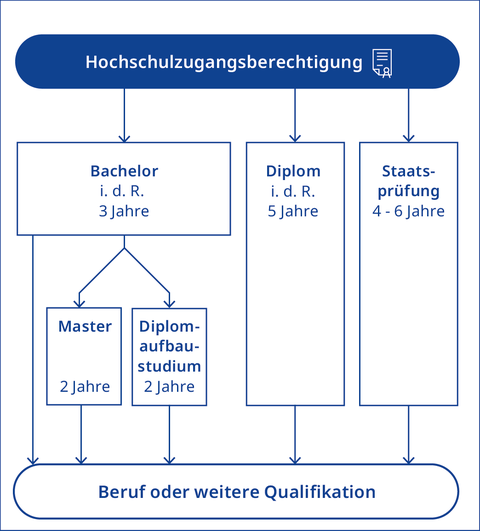Studienabschlüsse
Inhaltsverzeichnis
An der TU Dresden können die folgenden Studienabschlüsse erworben werden:
- Bachelor
- Master
- Diplom und
- Staatsprüfung
Um Bachelor-, Diplom- und Staatsprüfungsstudiengänge absolvieren zu können, ist eine Hochschulzugangsberechtigung (z. B. Abitur) notwendig. Master- und Aufbaustudiengänge setzen ein erstes grundständiges Studium voraus. Üblicherweise ist das ein Bachelorstudium.
Die Abschlüsse Master, Diplom und Staatsprüfung bilden jeweils das gleiche Abschlussniveau. Danach ist eine Promotion (Erwerb des Doktorgrades) möglich.
Alle angebotenen Studienabschlüsse sind passfähig im Europäischen Hochschulraum. Das bedeutet, dass die Studienabschlüsse europaweit vergleichbar sind und die Studienleistungen an jeder deutschen und europäischen Hochschule angerechnet werden können (gilt eingeschränkt für Staatsprüfung). Dadurch sind Wechsel des Studienortes und des Studiengangs sowie Auslandsaufenthalte möglich.
Welcher Studiengang der TU Dresden mit welchem Abschluss beendet wird, steht im Studieninformationssystem.
Bachelor
Im Bachelorstudium werden wissenschaftliche Grundlagen, anwendungsorientiertes Basiswissen und berufsfeldbezogene Qualifikationen erworben. Soziale und weitere Schlüsselkompetenzen ergänzen das Studium.
In einigen Bachelorstudiengängen (vor allem in den Geisteswissenschaften) belegt man gleichzeitig mehrere Studienfächer mit Hauptfächern und/oder Ergänzungsbereichen. Am Ende des Studiums wird eine Bachelorarbeit geschrieben.
Die TU Dresden verleiht in den Natur- und Ingenieurwissenschaften den akademischen Grad „Bachelor of Science“ und in den Geistes- und Sozialwissenschaften den akademischen Grad „Bachelor of Arts“.
Der Bachelorabschluss ist ein erster berufsqualifizierender Hochschulabschluss. Anschließend kann eine Berufstätigkeit aufgenommen oder ein Masterstudium angeschlossen werden. Auch ein Diplom-Aufbaustudium ist möglich.
Master
Das Masterstudium ermöglicht eine weitere inhaltliche Vertiefung oder Spezialisierung in derselben beziehungsweise ähnlichen Fachrichtung oder eine interdisziplinäre Erweiterung der vorhandenen Qualifikationen.
Das Masterstudium bereitet sowohl auf eine wissenschaftliche Tätigkeit an Hochschulen vor als auch auf Berufsfelder, die eine vertiefte wissenschaftliche Ausbildung erfordern. Es gibt auch weiterbildende Studiengänge, die mit einem Master abschließen. Diese setzen Berufserfahrung voraus.
Den Abschluss des Studiums bildet die Masterarbeit, eine eigenständige wissenschaftliche Arbeit. An der TU Dresden werden vor allem die akademische Grade „Master of Science“ und „Master of Arts“ verliehen.
Das Masterstudium bietet die Möglichkeit, sowohl den Studienort als auch die fachliche Ausrichtung des Studiums neu zu wählen.
Diplom
Das Diplomstudium, das vor allem für Ingenieurwissenschaften angeboten wird, gliedert sich meist in ein (in der Regel zweijähriges) Grundstudium und ein anschließendes Hauptstudium. Das Hauptstudium dient der Vertiefung der bisher erworbenen Kompetenzen sowie der wissenschaftlichen Spezialisierung. Dafür sind Studienrichtungen oder Schwerpunkte entsprechend den eigenen Interessen und Zukunftsplänen zu wählen.
Das Diplomstudium führt in einem Zuge – ohne die Notwendigkeit einer weiteren Bewerbung – zu einem mit dem Master vergleichbaren Abschluss. Die TU Dresden verleiht am Ende des Studiums einen Diplom-Grad (z. B. Diplom-Ingenieur:in, Diplom-Informatiker:in).
In sogenannten Aufbaustudiengängen kann man das Diplom im Anschluss an einen zuvor abgeschlossenen Studiengang erwerben. Das Diplomstudium hat in diesem Fall in etwa den Umfang eines Masterstudiums.
Staatsprüfung
In den Studiengängen Lebensmittelchemie, Medizin, Modellstudiengang Humanmedizin und Zahnmedizin sowie den Lehramtsstudiengängen wird das Studium mit einer staatlichen Prüfung abgeschlossen.
Staatsprüfungen werden in Studiengängen abgelegt, in denen der Staat die Berufsausübung überwacht. Wer solche Berufe ausübt, trägt in der Regel große Verantwortung gegenüber anderen Menschen. Ausbildung und Prüfung sind deshalb auch landes- oder bundesweit einheitlich geregelt.
Bei den meisten Studiengängen mit Staatsprüfung erfolgt während oder nach dem Hochschulstudium eine Phase der praktischen Tätigkeit (Referendariat oder praktisches Jahr), nach der die abschließende Staatsprüfung abgelegt wird. Erst danach ist das Führen der entsprechenden Berufsbezeichnung erlaubt.
Kontakt
 © Sven Ellger/TUD
© Sven Ellger/TUD
Zentrale Studienberatung
Eine verschlüsselte E-Mail über das SecureMail-Portal versenden (nur für TUD-externe Personen).
Besuchsadresse:
Fritz-Foerster-Bau, Etage 0 Mommsenstraße 6
01069 Dresden
Sprechzeiten:
- Montag:
- 10:00 - 12:00
- Dienstag:
- 13:00 - 16:00
- Donnerstag:
- 13:00 - 16:00
- Freitag:
- 09:00 - 12:00
Während der Sprechzeiten ist ein:e Studienberater:in für Sie ohne Termin für eine Kurzberatung erreichbar. Bitte holen Sie sich zuerst eine Aufrufmarke am Servicepoint des ServiceCenterStudium. Sie können uns alternativ auch anrufen.


